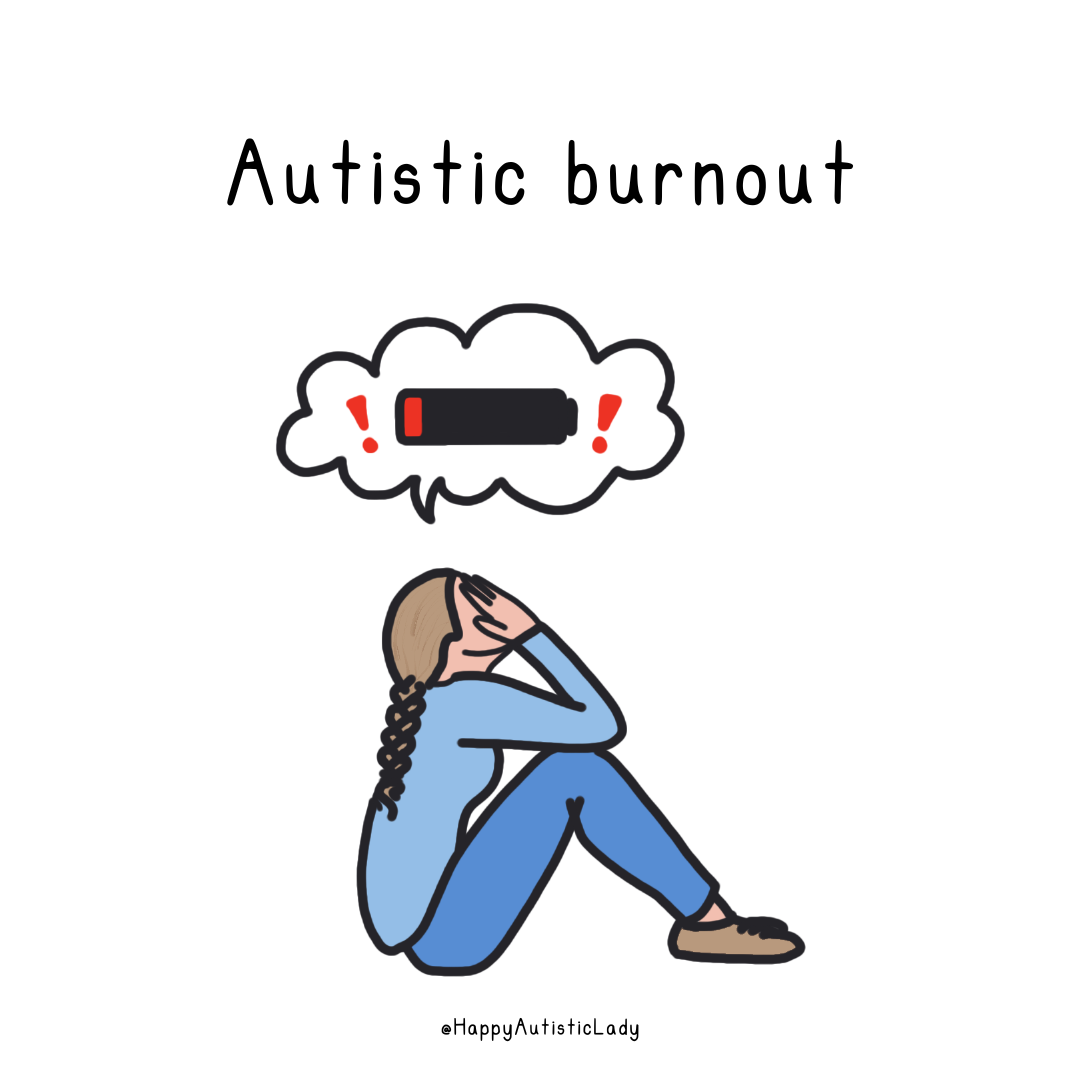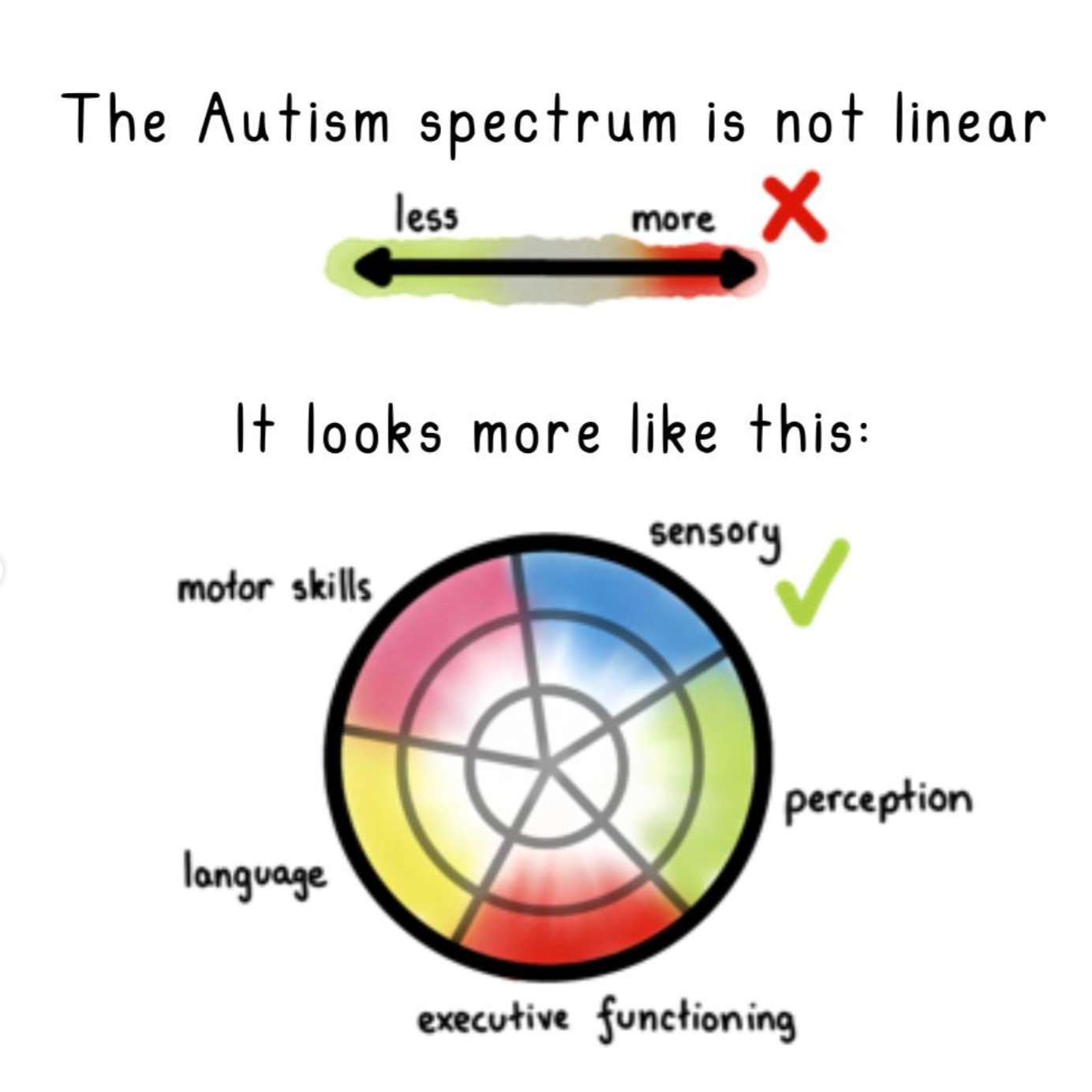Autism
What is Autism?
Autism, or autism spectrum (AS) affects how a person perceives the world and interacts with others. The term "spectrum" in autism spectrum refers to the wide variation in strengths and challenges possessed by each Autistic person. Autism is present from birth and influences the development of the brain in areas related to social interaction and communication skills.
Autism is a Spectrum
Autism is a spectrum. This means every Autistic person is different. Some Autistic people may have low support needs, while others may have high support needs. Some refer to this as “high-functioning Autism” versus “low-functioning Autism”. However, these terms are problematic and increasingly recognised as disrespectful for several reasons:
Oversimplification of Autism: Autism is a complex and multi-dimensional spectrum. Describing someone as "low-" or "high-functioning" oversimplifies this complexity and reduces a person’s entire being and experience to a single, linear scale. Autism affects individuals uniquely, with a wide range of strengths, challenges, and needs that cannot be adequately captured by such terms. Also, every Autistic person’s experiences, strengths, and challenges vary day to day. This means that one day an Autistic person may have high support needs, while another day the same person will have low support needs.
Misleading implications: The terms "low-" and "high-functioning" can be misleading. "High-functioning" may imply that a person needs little or no support at all. In reality, this ignores the variety of challenges and strengths the person may experience in various areas like mental health, sensory sensitivities, or communication. This can lead to underestimating the amount and type of support the person requires. Conversely, "low-functioning" can overshadow a person’s abilities, strengths, and potential, leading to lower expectations and opportunities for engagement and growth.
Ableism and judgment: The terms implicitly define a person’s worth based on their capabilities and Autistic traits, which are inherently ableist. Ableism is the discrimination of and social prejudice against people with disabilities based on the belief that neurotypical or able-bodied abilities are superior. Using such functioning labels perpetuates ableism and a hierarchy of values based on ability.
Preference of the Autistic community: Many within the Autistic community and their allies advocate for language that respects their identity and experiences. The shift towards using "low support needs" and "high support needs" is a move to focus on what a person requires to thrive, rather than on what the person can or cannot do. This terminology acknowledges that everyone has unique needs and emphasises the importance of providing appropriate support based on those needs.
Autism Traits
Autism signs and traits can vary widely among individuals, but there are several common traits. Some Autistic traits include:
Special interests: Highly focused interests in specific subjects or activities.
Sensory Sensitivity: Over- or under-sensitivity to sounds, lights, touch, tastes, and smells. This is also referred to as hyper- and hyposensitivity.
Repetitive behaviours: Engaging in repetitive movements (also referred to as stimming), such as rocking, spinning, and fidgeting.
Social interactions: Autistic people may have difficulties understanding social cues, and maintaining eye contact, and may prefer to play/spend time alone or with other Autistic and/or neurodivergent friends.
Communication: Autistic people may have difficulties with verbal and non-verbal communication including interpreting body language and facial expressions, delayed speech development, and experiencing verbal shutdowns.
Difficulty with change: Struggling with changes to routine or environment, which can lead to distress or anxiety.
Echolalia: Frequently repeating words or phrases out loud or in your head heard in the past.
Mental health: 80% of Autistic adults experience mental health issues. This can include depression, anxiety, eating disorders, and more.
Emotional regulation: Autistic people may struggle with emotional regulation. This is when a person struggles to regulate and control their emotions. Emotional dysregulation can show in a variety of ways including feeling overwhelmed, unpredictable outbursts, mental health issues, and meltdowns.
Meltdowns and shutdowns: Autistic people may experience meltdowns or shutdowns. A meltdown is a temporary and involuntary loss of behavioural control. This can show in verbal ways (e.g. crying, shouting, screaming) or physical ways (e.g. kicking, lashing out, and biting). Shutdowns may present as a verbal shutdown (not being able to verbally communicate) or a physical shutdown (feeling unable to physically move or get up).
Autistic Women and Girls
Autism in women and girls is often underdiagnosed or misdiagnosed because of diagnostic bias and lack of awareness among healthcare professionals, and masking. The average age when Autistic girls are diagnosed is between the ages 10 and 12, compared to ages 4-6 for boys. To read more about Autistic women and girls click here.
FAQs
Q: Can Autism be cured?
There is no cure for Autism, but there are many tools, resources, and practices that can help Autistic people live happy and healthy lives. It is important to remember that while Autistic people are different, there is nothing about them or Autism that needs to be “cured”.
Q: How is Autism diagnosed?
Autism is diagnosed through behavioural assessments and developmental screenings conducted by healthcare professionals.
Q: Do vaccines cause Autism?
Extensive research has shown that vaccines do not cause Autism. Vaccines are a safe and essential part of preventive healthcare.
Q: Can adults be diagnosed Autistic?
Yes, adults can be diagnosed Autistic. Awareness and understanding of Autism amongst adults is increasing, leading to more adults seeking and receiving a diagnosis, and getting the support they need and deserve.
Other Resources and External Links
National Autistic Society (UK): Offers information, support, and initiatives for those affected by autism.
NHS - Autism: Provides comprehensive information about diagnosis, everyday life, and Autism support in the UK.
Autistica: A UK charity funding research into understanding the causes of autism and developing practical interventions.
Autistic Girls Network: Offers information and raises awareness about Autistic girls and gender diversity among Autistic people.
Ambitious about Autism: A charity for Autistic children and young people providing online resources, and creating work opportunities for young Autistic people.
Other Autism Topics
-

Autism and Women
Do Autistic traits present differently in women? What is the diagnosis gender gap? And more…
-

Are There More Autistic People Than There Used To Be?
-

Understanding Autistic Burnout
Ever wondered how Autistic burnout is different? How it feels, and most importantly, how you recover? You’re in the right place!
-

Autism and Sport – It’s Everybody’s Game
Sport is a huge part of many people’s lives, whether taking part, watching and following a particular team or athlete, or a combination of both. The stereotypical view of Autism might suggest that…
-

Autism Gift Ideas
Are you looking for the perfect Autism gift for adults or kids? Check out this list with 20 Autism gift ideas ideal for birthdays, Christmases, and any special occasion.
